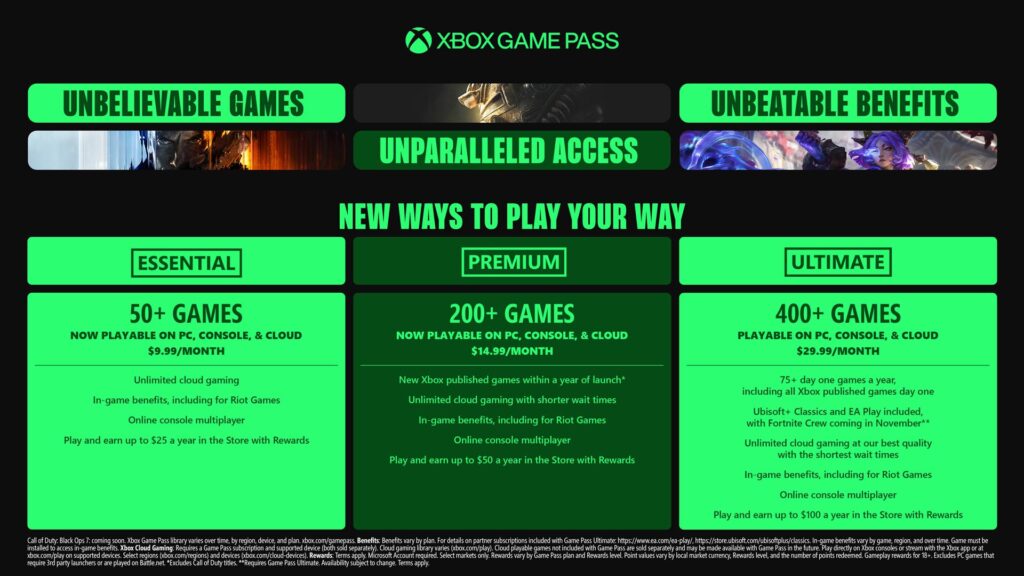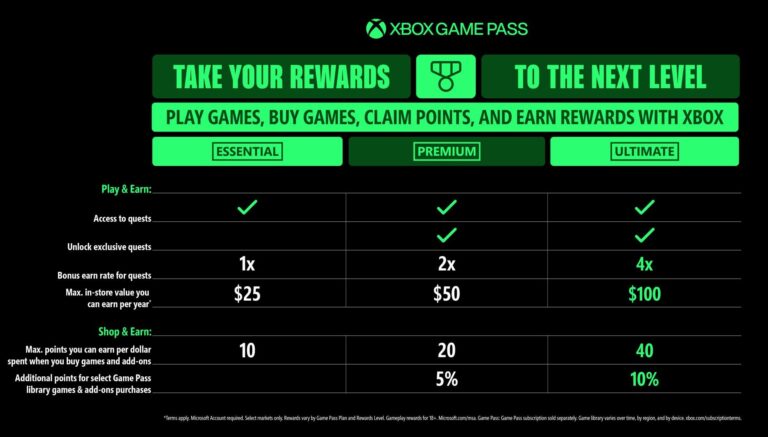Main Navigation Menu
© 2025 Tech Jacks Soutions, All Rights Reserved
© 2025 Tech Jacks Soutions, All Rights Reserved

Game Pass regional exploitation has emerged as Microsoft implements discriminatory pricing strategies where certain countries face up to 100% subscription cost increases while others receive regulatory protection. Game World Observer reports Microsoft increases Game Pass price in Turkey and Argentina again, up to 100% depending on subscription tier demonstrating systematic targeting of economically vulnerable markets for aggressive monetization. The geographical discrimination exposes corporate strategy prioritizing revenue extraction over global equity where regulatory absence enables exploitation impossible in protected jurisdictions.

The 100% price increases targeting Turkey and Argentina represent most aggressive subscription monetization in gaming industry history where Microsoft doubles costs in economically challenged markets. The Game Pass regional exploitation demonstrates predatory pricing where corporate profit maximization supersedes ethical considerations about affordability equity across global customer base.
The regional targeting suggests deliberate strategy exploiting currency devaluation and inflation affecting developing economies. When corporations implement triple-digit price increases in struggling markets while maintaining restraint in wealthier nations, the discrimination reveals opportunistic extraction rather than uniform cost-recovery policies.
The Turkey and Argentina focus indicates Microsoft identifies markets with limited consumer protection and weak regulatory oversight for experimental aggressive pricing. The Game Pass regional exploitation creates test environments determining maximum sustainable exploitation levels before triggering catastrophic subscriber loss or governmental intervention.
The percentage increases dwarf the 50% U.S. Ultimate tier adjustments suggesting Microsoft believes developing market consumers possess less pricing power or competitive alternatives. When poorer countries face double the percentage increases compared to wealthier nations, the disparity exposes systematic global inequality in corporate monetization strategies.

GamesIndustry.biz analysis argues retailers were always going to drop Xbox over Game Pass contextualizing current exodus as predictable outcome of subscription strategy undermining physical software sales. The Xbox retail apocalypse validates concerns that digital-first business models destroy retailer incentives supporting hardware distribution when software profit opportunities evaporate.
The Game Pass economic model eliminates software sales commissions that historically justified retailer investments in console hardware despite low profit margins. When subscription services replace individual game purchases, the business model erodes retailer revenue streams, creating systematic conflict where distributors abandon platforms offering insufficient profit potential.
This retail abandonment shows how Microsoft’s digital strategy has alienated former distribution partners who invested billions to grow the Xbox ecosystem. The Xbox retail crisis illustrates relationship breakdowns where short-term Game Pass subscriber gains have sacrificed long-term retail collaborations crucial for broader market success.
The collapse of the distribution channel triggers a vicious cycle: retail abandonment reduces consumer access to hardware, limiting platform growth that could eventually lead to more Game Pass subscriptions. When retailers stop stocking consoles, Microsoft loses vital physical presence in mass-market shopping areas where impulse buying and gift-giving drive significant console sales.

PC Gamer reports Game Pass subscribers ‘in certain countries’ will not be affected by price increase ‘for now’ because government regulation is actually a good thing demonstrating how consumer protection laws constrain corporate exploitation. The Game Pass regional exploitation reveals value of regulatory frameworks preventing arbitrary price increases that occur in jurisdictions lacking subscriber safeguards.
The regulatory protection creates two-tier subscription reality where government intervention determines whether consumers face exploitation or receive protection from aggressive monetization. When identical services cost dramatically different percentages across borders based solely on regulatory environment, the disparity validates arguments for stronger global consumer protection standards.
Dual Shockers confirms some Xbox Game Pass subscribers won’t be impacted by price hike through governmental constraints on subscription price modifications. The selective exemption demonstrates Microsoft’s willingness implementing maximum exploitation wherever regulations permit while grudgingly respecting legal constraints in protected markets.
The “for now” qualification suggests Microsoft seeks regulatory changes or loopholes enabling future price increases in currently protected markets. The Game Pass regional exploitation includes long-term strategy where corporate lobbying potentially weakens consumer protections currently preventing exploitation already implemented in unregulated jurisdictions.

GamesRadar reports strange Xbox email suggests Game Pass price increase doesn’t apply to certain members creating confusion about pricing policy implementation across global subscriber base. The Game Pass regional exploitation includes communication opacity where selective messaging prevents comprehensive understanding of geographical discrimination patterns.
The email mystery suggests Microsoft deliberately obscures pricing policies to prevent international consumer coordination and comparison. When subscribers cannot easily determine whether they face exploitation relative to global counterparts, the information asymmetry enables discrimination that transparency would expose to political and social pressure.
The selective notification patterns may represent compliance with regional disclosure requirements while minimizing voluntary transparency beyond legal minimums. The Game Pass regional exploitation demonstrates corporate preference for opacity over clarity when pricing discrimination might trigger consumer backlash or regulatory scrutiny.
The strange communication indicates potential testing of messaging strategies determining optimal disclosure levels balancing legal compliance against subscriber awareness minimization. When corporations experiment with notification approaches, the behavior suggests deliberate manipulation rather than straightforward policy communication.

Microsoft’s official support documentation explains how to change country or region in Microsoft Store inadvertently enabling subscribers to exploit regional pricing disparities. The Game Pass regional exploitation creates economic incentives for geographic arbitrage where consumers use VPNs accessing cheaper subscription markets avoiding local price increases.
Reddit discussion addresses updating GamePass billing to new country currency demonstrating community knowledge about region-switching mechanics. The information sharing enables collective resistance against exploitation through technical workarounds that Microsoft’s systems theoretically prohibit but practically struggle preventing.
Microsoft Learn documentation on currencies and taxes provides technical infrastructure supporting global pricing while inadvertently revealing manipulation opportunities. The Game Pass regional exploitation creates cat-and-mouse dynamic where Microsoft implements geographic restrictions while subscribers develop circumvention techniques accessing favorable pricing.
The VPN economics suggest rational consumer behavior where global pricing inequality incentivizes technical sophistication exploiting system vulnerabilities. When corporations create dramatic price disparities across borders, the market distortions generate arbitrage opportunities that information-age technology enables consumers pursuing regardless of terms-of-service violations.

IGN provides breakdown of all new prices for Xbox Game Pass as of October 2025 documenting geographical variations in subscription costs. The Game Pass regional exploitation becomes quantifiable through comprehensive pricing comparison revealing systematic patterns in corporate discrimination favoring wealthier markets with stronger consumer protection.
OpenCritic analysis confirms Xbox Game Pass price hike hits some regions harder than others providing empirical validation of discriminatory pricing strategies. The documented disparity exposes corporate policy where percentage increases correlate inversely with regulatory strength and consumer protection frameworks.
The regional breakdown reveals pricing psychology where Microsoft implements maximum sustainable exploitation in each market based on competitive pressure, regulatory constraints, and perceived consumer price tolerance. The Game Pass regional exploitation demonstrates sophisticated market segmentation where identical services receive dramatically different valuations based purely on geographical location.
The price documentation enables international consumer awareness about exploitation patterns that opacity would otherwise conceal. When journalism provides comprehensive pricing comparison, the transparency creates political pressure for regulatory intervention protecting consumers in currently undefended markets.

Xbox Wire’s official announcement about Game Pass Ultimate, Game Pass Core, and PC Game Pass price changes provides corporate messaging about subscription adjustments without addressing regional discrimination. The Game Pass regional exploitation receives zero justification or acknowledgment in official communications suggesting Microsoft recognizes ethical problems with geographical inequality.
The announcement absence of regional disparity discussion indicates deliberate communication strategy avoiding topics that might trigger consumer backlash or regulatory scrutiny. When corporations announce price increases without explaining geographical variations, the omission reveals awareness that transparent discussion would expose indefensible discrimination.
The official policy framing emphasizes service enhancements and value delivery without addressing how identical improvements justify 50% increases in wealthy markets while demanding 100% adjustments in developing economies. The Game Pass regional exploitation requires justification Microsoft apparently cannot provide without admitting opportunistic extraction from vulnerable populations.
The corporate communication pattern suggests legal review where disclosure minimization reduces liability risks while maintaining policy flexibility. When companies carefully limit official statements about controversial practices, the caution indicates awareness that fuller transparency would create legal or political vulnerabilities.

Traditional purchasing power parity theory suggests prices should adjust for local economic conditions creating equivalent value across markets. The Game Pass regional exploitation violates this principle by implementing higher percentage increases in economically weaker markets creating greater relative burden on lower-income populations.
The economic theory application would require Turkey and Argentina receiving price decreases or stability compensating for currency devaluation and inflation. Microsoft’s opposite approach implementing massive increases during economic hardship demonstrates profit prioritization over equitable global access to entertainment services.
The purchasing power analysis reveals how subscription services enable geographic price discrimination impossible with physical goods subject to arbitrage through gray market importing. The Game Pass regional exploitation exploits digital distribution’s borderless nature while implementing artificial regional restrictions preventing consumer arbitrage that would equalize pricing.
The economic inequality compounds through subscription model where ongoing payments create perpetual extraction unlike one-time purchases allowing consumers to delay or avoid transactions during financial hardship. When services require continuous payment for maintained access, the recurring costs disproportionately burden economically challenged populations facing aggressive regional pricing.

Game Pass regional exploitation exposes Microsoft’s systematic geographic discrimination where developing markets face up to 100% price increases while wealthier jurisdictions receive regulatory protection. The Turkey and Argentina targeting demonstrates predatory pricing where corporate profit maximization supersedes ethical considerations about global affordability equity.
The 100% increases represent most aggressive subscription monetization in gaming industry history where Microsoft doubles costs in economically challenged markets. The regional targeting suggests deliberate exploitation of currency devaluation and regulatory absence in markets lacking consumer protection frameworks constraining corporate behavior.
Regulatory protection disparity validates government intervention value where legal frameworks prevent arbitrary price increases occurring in unprotected jurisdictions. The two-tier reality demonstrates how consumer protection laws determine whether subscribers face exploitation or receive safeguards against aggressive monetization.
Strange email patterns create communication opacity preventing comprehensive understanding of geographical discrimination. The selective messaging enables discrimination that transparency would expose to political and social pressure while maintaining technical legal compliance with regional disclosure requirements.
Currency manipulation opportunities through VPN region-switching create economic incentives for geographic arbitrage. The Game Pass regional exploitation generates cat-and-mouse dynamic where dramatic price disparities incentivize technical circumvention that information-age technology enables regardless of terms-of-service prohibitions.
Regional price breakdown documentation enables international awareness about exploitation patterns that opacity would conceal. The comprehensive comparison creates transparency generating political pressure for regulatory intervention protecting consumers in currently undefended markets facing maximum corporate extraction.
Official policy announcements avoid regional disparity discussion indicating Microsoft recognizes ethical problems with geographical inequality. The communication omission reveals awareness that transparent justification would expose indefensible discrimination against economically vulnerable populations.
Purchasing power parity violations demonstrate profit prioritization over equitable global access where economically weaker markets receive higher percentage increases. The economic theory betrayal exposes how digital distribution enables geographic price discrimination while artificial restrictions prevent consumer arbitrage equalizing costs.
Smart global consumers should recognize Game Pass regional exploitation as systematic inequality requiring regulatory intervention and collective resistance. The geographical discrimination validates arguments for stronger international consumer protection standards preventing corporations from exploiting regulatory arbitrage opportunities.
Microsoft’s pricing strategy damages gaming accessibility in developing markets where entertainment services should provide affordable escapes rather than becoming luxury goods through exploitative monetization. The regional discrimination creates digital divide where geographical location determines subscription affordability independent of service value or corporate costs.
Gaming deserves equitable global pricing respecting economic realities rather than exploiting vulnerable markets for maximum revenue extraction. The Game Pass regional exploitation provides cautionary tale about subscription service risks when corporate profit motives operate without regulatory constraints or ethical considerations.
